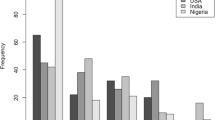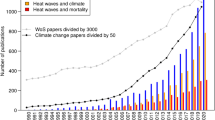Abstract
Communication of uncertainty information in Intergovernmental Panel on Climate Change (IPCC) assessments has evolved through successive reports to provide increasingly formal classifications for subjective and objective information. The first IPCC assessments provided uncertainty information in largely subjective form via linguistic categorizations depicting different levels of confidence. Recent assessments have codified linguistic terms to avoid ambiguity and introduced probabilistic ranges to express likelihoods of events occurring. The adoption of formal schemes to express likelihood and confidence provides more powerful means for analysts to express uncertainty. However, the combination of these two metrics to assess information may engender confusion when low confidence levels are matched with very high/low likelihoods that have implicit high confidence. Part of the difficulty is that the degree to which different quantities in the assessments are known varies tremendously. One solution is to provide likelihood information in a scheme with a range of different precision levels that can be matched to the level of understanding. A version of this scheme is also part of the IPCC uncertainty guidance and is described here.
Similar content being viewed by others
References
Allen M, Booth B, Frame D, Gregory J, Kettleborough J, Smith L, Stainforth D, Stott P (2004) Observational constraints on future climate: distinguishing robust from model-dependent statements of uncertainty in climate forecasting. In: IPCC workshop on describing scientific uncertainties in climate change to support analysis of risk and of options, Ireland, 11–13 May 2004
Dessai S, Hulme M (2004) Does climate adaptation policy need probabilities? Clim Policy 4(2):107–128
Funtowicz S, Ravetz J (1990) Uncertainty and quality in science for policy. Kluwer, Dordrecht, p 229
Giles J (2002) When doubt is a sure thing. Nature 418:476–478
Houghton JT, Ding Y, Griggs DJ, Noguer M, van der Linden PJ, Dai X, Maskell K, Johnson CA (eds) (2001) Climate change 2001: the scientific basis. Cambridge University Press, Cambridge, p 881
Houghton JT et al (eds) (1996) Climate change 1995: the science of climate change. Cambridge University Press, Cambridge, p 572
Houghton JT, Jenkins G, Ephraums J (eds) (1990) Climate change: the IPCC scientific assessment. Cambridge University Press, Cambridge, p 365
IPCC (2006) Guidance notes for lead authors of the IPCC fourth assessment report on addressing uncertainties. Appendix in Manning 2006. Adv Clim Change Res 2:13–21
Jaeger J (1988) Developing policies for responding to climate change. Technical report, World Meteorological Organization. WCIP-1, WMO/TD-No. 225, p 53
Kandlikar M, Risbey J, Dessai S (2005) Representing and communicating deep uncertainty in climate change assessments. Comptes Rendus Geosci 337(4):443–455
Manabe S, Stouffer R (1993) Century-scale effects of increased atmospheric CO2 on the ocean-atmosphere system. Nature 364(6434):215–218
Manning M (2006) The treatment of uncertainties in the Fourth IPCC Assessment Report. Adv Clim Change Res 2(1):13–21
Manning M, Petit M (2004) A concept paper for the AR4 cross cutting theme: uncertainties and risk. Position paper for the IPCC Risk and Uncertainty workshop, Maynooth, Ireland, May 2004
Mastrandrea M, Schneider SH (2004) Probabilistic integrated assessment of ‘dangerous’ climate change. Science 304:571–575
Moss R, Schneider SH (2000) Uncertainties in the IPCC TAR: Recommendations to lead authors for more consistent assessment and reporting. In: Pachauri R, Taniguchi T, Tanaka K (eds) Guidance papers on the cross cutting issues of the third assessment report of the IPCC. Technical report. World Meteorological Organization, Geneva, pp 33–51
Murphy J, Sexton DMH, Barnett DN, Jones GS, Webb MJ, Collins M, Stainforth DA (2004) Quantification of modelling uncertainties in a large ensemble of climate change simulations. Nature 430:768–772
National Research Council (1979) Carbon dioxide and climate: a scientific assessment. National Academy Press, Washington, DC, p 22
National Research Council (1982) Carbon dioxide and climate: A second assessment. National Academy Press, Washington, DC, p 72
National Research Council (1992) Policy implications of greenhouse warming: mitigation, adaptation, and the science base. National Academy Press, Washington, DC, p 944
Ravetz J (1971) Scientific knowledge and its social problems. Clarendon, Oxford, p 449 (reprint: Transaction, New Brunswick, 1996)
Risbey JS (2002) Comment on Soon et al. 2002: modeling climatic effects of anthropogenic carbon dioxide emissions: unknowns and uncertainties. Clim Res 22(2):185–186
Risbey JS, Lamb PJ, Miller RL, Morgan MC, Roe GH (2002) Exploring the structure of regional climate scenarios by combining synoptic and dynamic guidance and GCM output. J Clim 15(9):1036–1050
Schrader-Frechette K (1984) Science policy, ethics, and economic methodology: some problems of technology assessment and environmental impact analysis. Reidel, Dordrecht
Shackley S, Risbey J, Stone P, Wynne B (1999) Adjusting to policy expectations in climate change modeling: an interdisciplinary study of flux adjustments in coupled atmosphere-ocean general circulation models. Clim Change 43(2):413–454
van der Sluijs J (1997) Anchoring amid uncertainty. Ph.D. Thesis, University of Utrecht, Utrecht, p 260
van der Sluijs J, Craye M, Funtowicz S, Kloprogge P, Ravetz J, Risbey J (2005a) Combining quantitative and qualitative measures of uncertainty in model-based environmental assessment: the NUSAP system. Risk Anal 25(2):481–492
van der Sluijs J, Craye M, Funtowicz S, Kloprogge P, Ravetz J, Risbey J (2005b) Experiences with the NUSAP system for multidimensional uncertainty assessment. Water Sci Technol 52(6):133–144
van der Sluijs J, Eijndhoven J, Shackley S, Wynne B (1998) Anchoring devices in science for policy: the case of consensus around climate sensitivity. Soc Stud Sci 28(2):291–323
Wallsten T, Budescu D, Zwick R (1993) Comparing the calibration and coherence of numerical and verbal probability judgments. Manage Sci 39:176–190
Author information
Authors and Affiliations
Corresponding author
Rights and permissions
About this article
Cite this article
Risbey, J.S., Kandlikar, M. Expressions of likelihood and confidence in the IPCC uncertainty assessment process. Climatic Change 85, 19–31 (2007). https://doi.org/10.1007/s10584-007-9315-7
Received:
Accepted:
Published:
Issue Date:
DOI: https://doi.org/10.1007/s10584-007-9315-7




